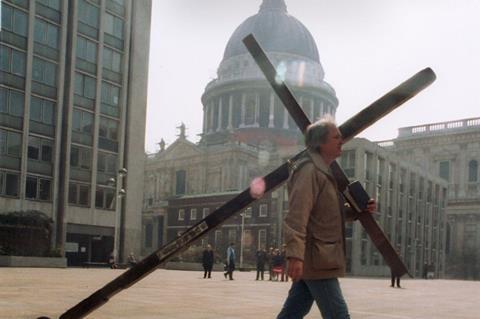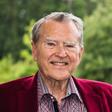The evangelist Arthur Blessitt became world-famous through carrying a 12 foot cross around the globe in the hope of having conversations with strangers about the gospel. Like many church leaders, RT Kendall was keen to invite Blessitt to speak. Little did he know the upheaval it would cause

Arthur Blessitt, best known as the man who carried a twelve foot cross around the world, has died at the age of 84.
He was a one of a kind evangelist. During the Jesus Movement of the 1960s he began a coffee house ministry in Hollywood’s Sunset Strip called His Place. He initially nailed the cross to the wall in his coffee house. He said that while praying one morning at 5am, God told him to take the cross down and carry it around the world. “If I knew I was going to carry it, I would not have made it so big”, he later said.
His ministry was essentially witnessing for Jesus Christ through personal conversation. He began walking from Hollywood to Washington D.C. The journey carried on and eventually he carried his cross 43,346 miles across 324 countries. He is listed in the Guinness Book of Records as having undertaken the world’s longest ongoing pilgrimage.
He met with heads of state, became a friend of Billy Graham, was given the Sinai Peace Medal, stayed in Prime Minister Menachem Begin’s home, spent time with Palestinian leader Yasser Arafat and witnessed to every Israeli general.
He walked across Canada, Great Britain and all over Africa including the Sahara dessert. It is possible that he led more people to Christ on a one-to-one basis than any other person.
Meeting Arthur
In 1982, I arranged for Arthur to speak at Westminster Chapel, where I was ministering. Just before the meeting, he mentioned giving an invitation at the end of his sermon. I interrupted him: “We don’t do that here.” “We don’t?” he asked incredulously. When I saw the look on his face, I said: “Well, if you feel led, go ahead.” He replied: “I can tell you right now, I do.” That day, he spoke to some 2,000 people on the subject of “Why do we need the cross?” At least 80 people stood to receive Christ.
I was so moved by that service that I asked Arthur if he would spend the month of May 1982 with us, taking every Sunday night service while I took the morning services. He said: “If I agree, are you going to let me be myself or handcuff me?” I assured him he could be himself. But I died a thousand deaths. He went utterly against our tradition. Later, however, I announced to the church that I invited Arthur to preach for us for another month. I knelt with him as he prayed. Knowing this would cost us, he looked at me and said: “Are you ready?” I said that I was. He stayed for six weeks.
Arthur Blessitt turned Westminster Chapel upside down. It led to the greatest trial of my life. After the first Sunday evening, one of our twelve deacons said: “I won’t be back until he is gone”. That was the beginning of the largest upheaval in the history of the church, a tempestuous era that lasted at least four years.
Three huge changes
Arthur got us doing at least three things that were unprecedented for us.
First, he gave a public invitation for people to receive Christ. That had never been done at Westminster Chapel, whether in the ministry of G Campbell Morgan (d.1945) who was the pastor for some 22 years, or Dr Martyn Lloyd Jones (d.1981) who was there for 30 years and who put me there. Dr Lloyd-Jones would not give an invitation (or appeal) because he felt it competed with the Holy Spirit. He was the only minister in London who would not support Billy Graham.
Arthur always gave his appeal at the end of his sermon. On the final Sunday evening in May 1982 my own daughter Melissa came forward to receive Christ as her Lord and Saviour. He never pressured people, he only asked them to stand if they wanted to receive the Lord.
The second major change was that Arthur wanted us to sing some choruses and not only traditional hymns. He said to the audience: “Does anybody here play a guitar?” After the third service a guitar player assisted in the worship. I never dreamed that singing choruses and contemporary songs could be so offensive to Westminster Chapel members. But, strange as it may seem, that was the hardest thing for our members to cope with. Most wanted only the hymns from the hymn book – nothing more.
The third unprecedented change was Arthur getting us on the streets of Victoria and Westminster to talk directly to passers-by about Jesus Christ. He would walk up to anyone and ask them whether they knew they would go to heaven if they died that day. I never did that in my whole life! I assumed I was fulfilling my calling when preaching the gospel from the pulpit. But God dealt with me in a memorable and unmistakable manner. So I kept it up until I retired. It was, at first, the hardest thing I ever did. But it changed my life. It changed Westminster Chapel.
After Arthur left I kept up what he started. But the price we paid was high. It became the most horrible four years of my life. In early 1984, three deacons stood against our ministry. By Christmas, six deacons wrote a letter to every member of Westminster Chapel, hoping to get me fired. It was the worst Christmas of my life. They accused me of heresy – antinomianism (lawlessness) because of my book Once Saved, Always Saved (which they had previously accepted). One of those deacons admitted that he did not believe I was antinomian at all, but hated our new style of worship. That was the offence. On January 16 1985, at a historic church meeting when six of our twelve deacons hoped to get me sacked, the church voted to dismiss them.
Soul winner
During May 1982, Arthur and I sat in Leicester Square eating ice cream cones. I asked him about meeting the then-Palestinian leader, Yasser Arafat. The conversation moved me so that I began immediately praying for Arafat every day. In July 2002, Canon Andrew White took me into Ramallah to meet him. Tears filled Arafat’s eyes when I told him I had prayed for him for the past 20 years. He then showed me a piece of Arthur Blessitt’s cross he kept on his desk. Arthur had cut off a piece of his cross to make a small one for Arafat to keep. After that, I visited with Arafat a further five time. I believe I will see him in heaven.
Arthur Blessitt’s influence on me has been incalculable, including turning me into a personal soul winner. It never crossed my mind that all the above would happen when I first asked him to preach for us. Next to my conversion, it was the best decision I ever made.







































No comments yet